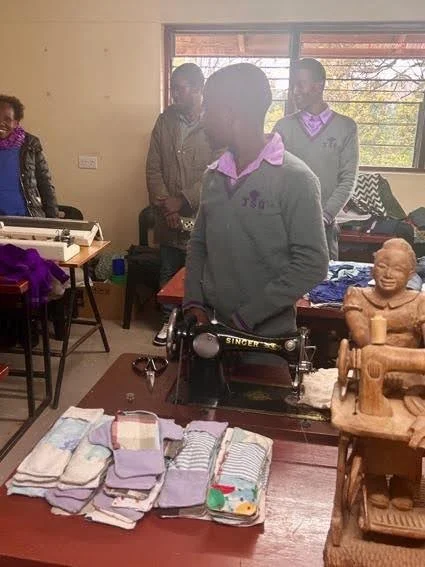Towards Greater Gender Equity: A Love Letter To Australia From Malawi
Lilongwe, July 2025
Dear Australia
Greetings from Malawi, the Warm Heart Of Africa.
We are a young country, and growing fast. 50% of our population is under the age of 35 years. Our maternal death rates, at around 250 deaths per 100,000 births, are around 100 times the rate in Australia (WHO). Only 33% of our kids finish primary school, and only 15% finish high school. (UNICEF).
We are a humble* country, living predominantly in the rural areas and overly reliant on market gardening and animal husbandry to meet our needs. When the rains fail (or flooding begins), we suffer terribly. And when these climatic events have passed, we suffer all the more.
With the exception of a few matrilineal communities, our cultural traditions are patriarchal . Girls are married off too early, their lives, bodies and prospects controlled by their husbands.
Despite these circumstances, we want to share some examples of how we make space for the voice and agency of our women and girls, and how we are working with our men to build a stronger gender-equal community that benefits us all.
Female Leaders & Faith
Strong women lie at the heart of community-led development in Malawi. Leaders like Mercy from Wandikweza, Patience from Ladder To Learning, Marie from Jacaranda School to Tadala from Tadala ABC School established by Match Foundation, women are pillars of strength in our community.
They have sacrificed everything to lead innovative organisations in community health, education and agriculture. While attending to the hard work of galvanising resources, volunteers and support as they build their programs and infrastructure to hold their dreams and invite the community into a more prosperous future, their leadership is imbued with a deep faith - a faith in community, their personal ability to affect change, and more often than not, faith in a higher power that is unwavering and filters through to their vision and purpose statements.
To take on the enormity of the challenges that lie ahead here in Malawi, these leaders understand that a strong faith provides a well of energy and hope from which they can draw, and helps to bind the communities they serve around a common purpose.
Ultimately, a shared faith invites both a communion of hope and a steely resolve that the future will be better.
Our female leaders wear their faith with great pride.
Gender Role Modelling
Wandikwesa, Malawi - Nurse on Motorbike
At Wandikwesa, a community health initiative and drop-in centre for out-patients and expecting mothers, Mercy initiated a ’nurses on motorbikes’ program.
This unique mode of transport allows nurses to make home visits on motorbike to check-in on community health priorities, village by village. When the concept was introduced to a visiting group outside a village house alongside the motorbike in its sparkling glory, the Nurse on call was invited to step forward: the Nurse was a man.
Despite the fact that this is a job normally reserved for women, his wonderful smile speaks to his pride and engagement in his role, and his role in resetting gender norms for men in his community.
Wandikwesa, Malawi - Village Chief
And in a community that Wandikweza serves, it teaches nutrition and using all the food groups to make delicious and nourishing meals. One of the villages hosted a reception for the visiting Australian delegation.
When we met the group of elders from the village, the Chief was invited to step forward to make some welcoming remarks: the Chief was a woman, flanked by some bearded men, with a huge wingspan of a welcome that enveloped our group.
She spoke passionately about her community, and that, particularly when women come together, they have an unbreakable spirit to build a better future.
Gender Signalling At School
The classroom, beyond its core role to furnish knowledge and wisdom to young minds, is a place where norms and expectations are set.
Sewing Room - Jacaranda School, Blantyre
Visitors at Jacaranda School in Blantyre were ushered through the arts & crafts precinct on their small campus in a village on the outskirts of Blantyre. They moved through the music rooms, where a range of marimbas, mbiras and other African instruments were all lined up to play, to the arts room where kids were putting finishing touches to oil paintings of their village, to the sewing room where there were rows of kids behind machines making washable fabric sanitary pads in different coloured materials.
Founder Marie was explaining the importance of this initiative to provide alternatives to menstrual products that were beyond the financial reach for their female learners. The kids proudly stood up, introduced themselves, and showed us their handiwork. All the 4 kids sitting behind the sewing machines were boys.
In a language class at the Tadala (abc) School, the teacher of a Grade 1 class is running a phonetics lesson and walking through the pronunciation of the letters ‘l’ and ‘m’, and then building this out to words, like ‘map, meet, milk, mop, and mum’. She moved onto using these words in sentences, and brought the word ‘mop’ into a sentence. Without realising the import of her choice of subject, she declared in white chalk that ‘John wants to mop’!
While not being sure if John even knows what a mop is, or where it is kept, the symbolism of ‘John wants to mop’ should not be lost.
At the same school, set up by Malawi’s most accomplished tennis player (and female!), we were invited to meet the Principal and hear more about the structure, governance and program of the school's growth and development. Alongside the many colourful charts and graphs showing progress on enrolment and attendants, an organisational chart of the school council illustrated clearly how they bring the elders of the community in to represent the vision and ambitions of the school.
On the organisational chart, male elders were respectfully referred to as ‘Patrons’; female elders were respectfully referred to as ‘Matrons’.
How about that for a noun that has been elevated beyond the dormitory or hospital ward to its rightful place.
Let’s see more of that, please!
Teacher’s Blackboard - Tadala abc School, Malawi
And if the point needed to be made further, the adjacent classroom of older students was involved in building more complex sentences using nouns and verbs.
And we were delighted to note the sentence written up: ’This is the teacher - she is a smart girl!’
Forward, Together
We acknowledge the negative forces are at work threatening to skittle years of progress on gender norms and greater gender equity in your community. We read that parts of the ‘manosphere’ are feeling increasingly threatened by the progress and achievements that women own and deserve.
We hope the example and leadership of women like Mercy, and Marie, and Tadala and Patience and some of the anecdotes in this letter provide encouragement about what we are all trying to achieve, together.
While we acknowledge that ‘women hold up more than half the sky’, in our local Chichewa language we say 'Mutu umodzi sesnza denga’ which is translated as 'one head cannot hold up the ceiling alone’.
Remember that your progress is our inspiration, bringing the voices and agency of women forward, and working in partnership with men to build a more equal world for us all.
With much love from Malawi, the Warm Heart Of Africa.
*we have learned to use the word ‘humble’ rather than ‘poor’, ‘vulnerable’, or ‘disadvantaged’ because our humility lies at the heart of our strength and generosity towards each other.








